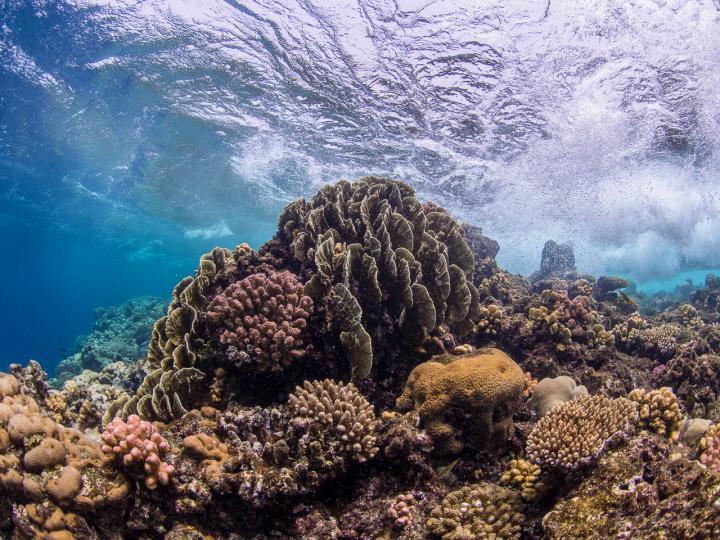
Credit: Anna Roik
Coral reefs are delicate ecosystems that are particularly sensitive to human influences such as climate change and environmental pollution. Even if the warming of the earth does not exceed 1.5 to 2 degrees Celsius – a limit set by the International Panel of Climate Change (IPCC) – more than 70 percent of coral reef ecosystems are likely to be lost, resulting in an economic and ecological catastrophe.
How do corals adapt to changing environmental conditions? How can we protect corals? Christian Voolstra, Professor of Genetics of Adaptation in Aquatic Systems at the University of Konstanz, assigns great importance to bacteria and other microorganisms. He emphasizes that no animal or plant lives alone – they are constantly interacting with bacteria and other microbes. Researchers call this a metaorganism – a tribute to the notion that all animal and plant hosts interact closely with their associated microbes. Corals are particular illustrative examples of metaorganisms, given that their association with photosynthetic microbial algae allows them to live like sessile plants. Since corals are bound to the place they settle, they have no choice but to adjust to the local environmental conditions. Bacteria and other microorganisms help with this by playing roles in the nutrition, metabolism and immune defence of a coral.
Different studies have shown that corals are associated with various bacteria that assumingly perform different functions. The following question, however, remained to be answered: Do the bacterial communities vary with prevailing environmental conditions or do they stay the same? Researchers have observed both cases. Based on this knowledge, the research team led by Professor Voolstra investigated two species of coral they believed to have considerable differences in terms of their strategies for associating with bacteria: The species Acropora hemprichii, assumed to flexibly associate with bacteria, and the species Pocillopora verrucosa that harbours highly consistent bacterial communities, irrespective of environmental differences. Their experiment was carried out over a period of 21 months in a marine ecosystem that is greatly affected by human activities: the Red Sea near Jeddah in Saudi Arabia. In order to investigate changes in coral associated bacterial communities that are exposed to stress, the researchers transplanted fragments of the same coral colonies into marine environments exposed to varying degrees of human influence. Using coral fragments from the same colony ensured that the samples had identical genetic material and that any changes could only be the result of environmental conditions.
“We could show that some corals respond flexibly to changing environmental conditions by associating themselves with certain bacteria, while other corals looked the same everywhere,” explains Professor Voolstra. In their study, the researchers were able to confirm their hypothesis that there are generalists among corals who are flexible and versatile, and that other species are specialized and consistent in their association with bacteria. The generalists’ ability to adapt provides cause for optimism because evolutionary adaptation processes would take far too long to allow coral to cope with the rapid changes brought about by climate change. By associating with new bacteria, the corals are able to react much faster ? these changes became apparent after only a few months. Furthermore, by transplanting the coral back into its original environment, the researchers discovered that the associated bacterial communities were able to return to their original state, thus recovering.
The example of Pocillopora verrucosa also shows that specialised corals can implement a successful survival strategy. “We must remember that the species we examined are those that have survived the tremendous changes of the past decade ? thus, both types of corals harbour successful strategies,” emphasizes Voolstra. This study shows that corals take advantage of the symbiotic relationship with bacteria in different ways. The research results contribute to the further development of coral probiotics – a method by which corals are specifically exposed to bacteria that help corals to adapt to changing conditions. The aim is to enhance the corals’ resilience to the extreme and rapid changes to their natural habitats and to prevent reefs from going extinct.
###
Facts:
- A study involving Professor Christian Voolstra, Professor of Genetics of Adaptation in Aquatic Systems at the University of Konstanz, investigated the interplay between corals and bacteria under changing environmental conditions
- Research results demonstrate that coral species use different adaptation strategies, which contribute to the further development of coral probiotics
- Original publication: Maren Ziegler, Carsten G. B. Grupstra, Marcelle M. Barreto, Martin Eaton, Jaafar BaOmar, Khalid Zubier, Abdulmohsin Al-Sofyani, Adnan J. Turki, Rupert Ormond & Christian R. Voolstra (2019) Coral bacterial community structure responds to environmental change in a host-specific manner. Nature Communications 10, article 3092. Link: https:/
/ www. nature. com/ articles/ s41467-019-10969-5
Note to editors:
You can download a photo here: https:/
Caption: A shallow coral reef in the Central Red Sea
Copyright: Anna Roik
Contact:
University of Konstanz
Communications and Marketing
Phone: +49 7531 88-3603
Email: [email protected]
Media Contact
Julia Wandt
[email protected]
Original Source
https:/
Related Journal Article
http://dx.




